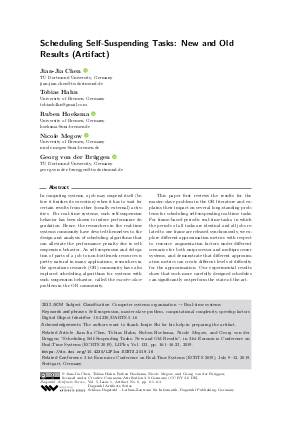Scheduling Self-Suspending Tasks: New and Old Results (Artifact)
Authors
Jian-Jia Chen  ,
Tobias Hahn,
Ruben Hoeksma
,
Tobias Hahn,
Ruben Hoeksma  ,
Nicole Megow
,
Nicole Megow  ,
Georg von der Brüggen
,
Georg von der Brüggen 
-
Part of:
Issue:
Special Issue of the 31st Euromicro Conference on Real-Time Systems (ECRTS 2019)
Part of: Volume: DARTS, Volume 5 (ECOOP 2019)
Part of: Conference: Euromicro Conference on Real-Time Systems (ECRTS)
Part of: Journal: Dagstuhl Artifacts Series (DARTS) - License:
 Creative Commons Attribution 3.0 Germany license
Creative Commons Attribution 3.0 Germany license
- Publication Date: 2019-07-08
Artifact Description

PDF
DARTS.5.1.6.pdf
- Filesize: 348 kB
- 3 pages
Document Identifiers
Subject Classification
ACM Subject Classification
- Computer systems organization → Real-time systems
Keywords
- Self-suspension
- master-slave problem
- computational complexity
- speedup factors
Metrics
- Access Statistics
-
Total Accesses (updated on a weekly basis)
0Document
0Metadata
Artifact
DARTS-5-1-6-artifact-bd6f6c7485f8985fd74d05a44782ef47.tar
(Filesize: 1.23 MB)
MD5 Sum:
bd6f6c7485f8985fd74d05a44782ef47
(Get MD5 Sum)
Abstract
In computing systems, a job may suspend itself (before it finishes its execution) when it has to wait for certain results from other (usually external) activities. For real-time systems, such self-suspension behavior has been shown to induce performance degradation. Hence, the researchers in the real-time systems community have devoted themselves to the design and analysis of scheduling algorithms that can alleviate the performance penalty due to self-suspension behavior. As self-suspension and delegation of parts of a job to non-bottleneck resources is pretty natural in many applications, researchers in the operations research (OR) community have also explored scheduling algorithms for systems with such suspension behavior, called the master-slave problem in the OR community. This paper first reviews the results for the master-slave problem in the OR literature and explains their impact on several long-standing problems for scheduling self-suspending real-time tasks. For frame-based periodic real-time tasks, in which the periods of all tasks are identical and all jobs related to one frame are released synchronously, we explore different approximation metrics with respect to resource augmentation factors under different scenarios for both uniprocessor and multiprocessor systems, and demonstrate that different approximation metrics can create different levels of difficulty for the approximation. Our experimental results show that such more carefully designed schedules can significantly outperform the state-of-the-art.
Cite As Get BibTex
Jian-Jia Chen, Tobias Hahn, Ruben Hoeksma, Nicole Megow, and Georg von der Brüggen. Scheduling Self-Suspending Tasks: New and Old Results (Artifact). In Special Issue of the 31st Euromicro Conference on Real-Time Systems (ECRTS 2019). Dagstuhl Artifacts Series (DARTS), Volume 5, Issue 1, pp. 6:1-6:3, Schloss Dagstuhl – Leibniz-Zentrum für Informatik (2019)
https://doi.org/10.4230/DARTS.5.1.6
BibTex
@Article{chen_et_al:DARTS.5.1.6,
author = {Chen, Jian-Jia and Hahn, Tobias and Hoeksma, Ruben and Megow, Nicole and von der Br\"{u}ggen, Georg},
title = {{Scheduling Self-Suspending Tasks: New and Old Results}},
pages = {6:1--6:3},
journal = {Dagstuhl Artifacts Series},
ISSN = {2509-8195},
year = {2019},
volume = {5},
number = {1},
editor = {Chen, Jian-Jia and Hahn, Tobias and Hoeksma, Ruben and Megow, Nicole and von der Br\"{u}ggen, Georg},
publisher = {Schloss Dagstuhl -- Leibniz-Zentrum f{\"u}r Informatik},
address = {Dagstuhl, Germany},
URL = {https://drops.dagstuhl.de/entities/document/10.4230/DARTS.5.1.6},
URN = {urn:nbn:de:0030-drops-107349},
doi = {10.4230/DARTS.5.1.6},
annote = {Keywords: Self-suspension, master-slave problem, computational complexity, speedup factors}
}
Author Details
Acknowledgements
The authors want to thank Junjie Shi for his help in preparing the artifact.
Related Article
- Jian-Jia Chen, Tobias Hahn, Ruben Hoeksma, Nicole Megow, and Georg von der Brüggen, "Scheduling Self-Suspending Tasks: New and Old Results", in 31st Euromicro Conference on Real-Time Systems (ECRTS 2019), LIPIcs, Vol. 133, pp. 16:1 - 16:23, 2019. https://dx.doi.org/10.4230/LIPIcs.ECRTS.2019.16
References
-
Jian-Jia Chen, Tobias Hahn, Ruben Hoeksma, Nicole Megow, and Georg von der Brüggen. Scheduling Self-Suspending Tasks: New and Old Results. In Proceedings of the 31st Euromicro Conference on Real-Time Systems (ECRTS 2019), 2019.

-
Sartaj Sahni and George L. Vairaktarakis. The master-slave paradigm in parallel computer and industrial settings. J. Global Optimization, 9(3-4):357-377, 1996.

-
Georg von der Brüggen, Wen-Hung Huang, Jian-Jia Chen, and Cong Liu. Uniprocessor Scheduling Strategies for Self-Suspending Task Systems. In Proceedings of the 24th International Conference on Real-Time Networks and Systems, RTNS 2016, Brest, France, October 19-21, 2016, pages 119-128, 2016.

